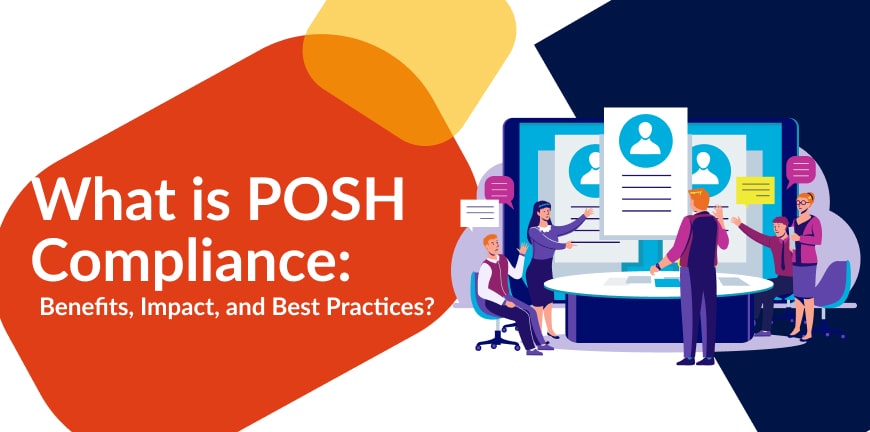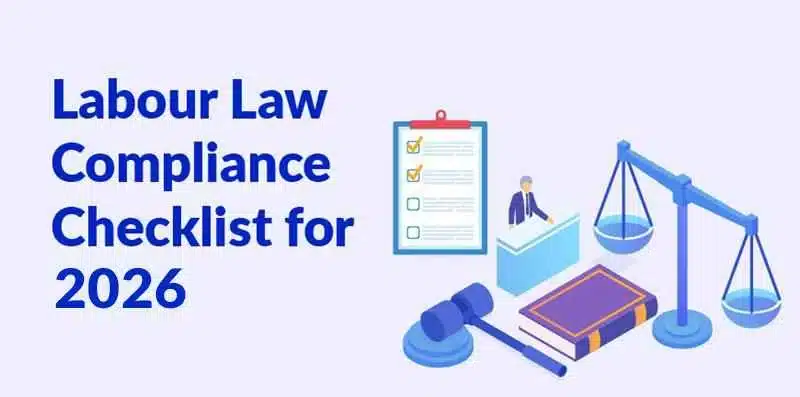
What is Legal Recruitment? Benefits, Process & Key Challenges
07/04/2025
What is BFSI Recruitment? Meaning, Process & Benefits
07/04/2025Creating a respectful and safe working environment for all employees is a primary objective for all organisations. POSH Act compliance is one such measure that empowers women to raise their voices against sexual harassment and help organisations combat this evil and put a full stop to it.
To achieve successful POSH compliance, both management and employees must work together to ensure that guidelines and procedures are followed on a day-to-day basis without compromise. Let’s delve deep and understand the benefits, impact, challenges, and best practices of POSH compliance to create a harassment-free work environment for all.
What is POSH Compliance? Meaning & Definition
The POSH full form is “Prevention of Sexual Harassment”. It refers to a set of guidelines, policies, and procedures designed by the Indian Parliament and deployed by the Ministry of Women and Child Development for the prevention, prohibition, and redressal of sexual harassment in the workplace.
POSH Act a.k.a Sexual Harassment of Women at Workplace (Prevention, Prohibition and Redressal) Act of 2013 was a significant move taken by the Indian government to put a full stop to sexual harassment of women and other employees in the workplace.
Any instances of sexual harassment that occur within the premises of the organisation must be reported under this act, and necessary disciplinary action must be taken by the management to ensure the victims are given justice for their ordeal.
POSH compliance means that ” Every Organisation that has 10 or more employees should implement the policies and guidelines of the POSH ACT without fail, and any deviation will lead to non-compliance, leading to penalties and legal troubles. POSH Act compliance involves:
- Deploying POSH policies and procedures throughout the organisation
- Conduct training sessions for employees and managers to ensure they understand and follow the guidelines diligently.
- Carry out a thorough investigation of incidents of sexual harassment and take strict action against the perpetrator.
Tip: To implement POSH compliance best practices in your organisation, it is advised to collaborate with a top POSH compliance agency like ALP Consulting rather than doing it internally, which can be tedious, and the chances of non-compliance are high.
How does POSH Compliance Work?
The POSH Compliance ACT asks all business organisations, private or public, to align with a prescribed set of procedures and guidelines to prevent, prohibit, and redress sexual harassment of any kind at the workplace. The aim of the POSH ACT is not only to protect female employees in the workplace, but also all women present within the premises of the organisation at any time.
Every person working within the company premises must know the POSH compliance meaning and must adhere to all the protocols and guidelines mentioned in the POSH compliance policy prepared by the organisation. Any violation of the POSH Act can invite trouble for the organisation in the form of penalties and legal cases.
What are the Benefits of POSH Compliance?
POSH Compliance can create a safe working environment for all employees and managers and increase the brand reputation of the organisation. The POSH compliance benefits include:
1. Safer working environment and increased trust
By following the POSH compliance checklist and guidelines promptly, a safe working environment can be created for employees as incidents of sexual harassment are prevented. This proactive approach will increase the trust among employees, and they will feel secure since they realise that the organisation is prioritising their needs above everything else.
2. Risk Mitigation and Legal Compliance
POSH Act compliance will help companies mitigate potential risks and prevent legal trouble. Having a proactive approach towards POSH compliance will create a positive working environment, reducing the chances of legal disputes and penalties due to non-compliance. During the POSH compliance audit, potential risks can be identified and mitigated on a priority basis, leading to a safe working environment for employees for the foreseeable future.
3. Improved employee productivity and retention
POSH compliance will ensure employees feel safe and will continue their contributions towards the success of the organisation. Moreover, POSH compliance will increase the company’s brand value, and in turn, employee retention rates will become higher. With long-term association, both employees and employers can achieve continued success, creating a win-win situation.
What are the Best Practices for Posh Compliance?
Creating a POSH policy as a part of organisational duties will not serve the real purpose. The main objective of the POSH Compliance Act is to create a safe and secure working environment for all employees. To achieve this, POSH compliance must be embedded into the fabric of the work culture.
Here are some POSH compliance best practices that organisations must follow to achieve 100% POSH compliance and mitigate instances of sexual harassment.
1. Develop clear and detailed POSH Policies
A detailed POSH policy that includes the POSH compliance meaning, definition of sexual harassment, incident reporting procedures, and the measures the organisation will take to deal with grievances must be made available to everyone in the organisation.
By setting clear guidelines, we can eliminate ambiguities, and employees can feel safe and secure that the organisation leaves no stone unturned to make POSH compliance successful.
2. Backing of Top management
Compliance always starts from the top. If the top management within the organisation is following POSH guidelines effectively, then it sends a strong message to employees that management is serious about POSH compliance and is committed to preventing sexual harassment.
3. A strong and dedicated POSH committee is warranted
To address any sexual harassment complaints, we need a strong POSH committee comprising qualified members and a chief officer who can make unbiased decisions. The committee must be well-trained in POSH policies and must be capable of maintaining confidentiality to ensure the safety of the complainant.
4. Conduct Regular online and offline POSH training sessions
All the employees and people involved in the organisation must undergo POSH compliance training regularly. The training mode can be both online and offline to ensure it reaches everyone, as companies may have different branches across the world.
The training can be conducted by both internal management experts and external trainers who have expertise and experience in POSH compliance deployment.
What is The Impact of POSH Compliance?
POSH ACT Compliance has created a significant impact in the workplace for the past decade. It has empowered employees to raise their voices against sexual harassment, creating a culture of mutual respect and trust.
As POSH compliance is considered a priority for every organisation, employees are feeling safer and can now devote all their time to their career growth and contributing towards their company’s success and brand-building efforts.
A POSH-compliant company will attract more investors and talented professionals, allowing companies to achieve sustained growth and prosperity. As we know no system is perfect, companies must continue their efforts in raising awareness and ensuring POSH compliance policies are executed day in and day out, creating a safe workplace with zero sexual harassment incidents.
What are the Steps to Achieve POSH Compliance?
POSH Act compliance has become an integral part of HR policies, and all companies must ensure it is implemented exactly as per the guidelines mentioned in the POSH Act 2013. Here is a step-by-step guide for achieving POSH compliance in your organisation.
1. Draft a detailed POSH Policy.
The organisation must prepare and POSH policy draft that includes all the required information, from what constitutes sexual harassment to how the incidents should be reported and appropriate punishment for the perpetrator. The POSH Policy must include:
- Clear definition of sexual harassment with examples
- Purpose and Objective
- Preventive Measures and Training Programs
- Reporting and Investigation Procedures
- Punishments for violations
- Compliance and Reporting
2. Train Employees and Managers on POSH Act Compliance
Training employees on POSH compliance best practices is critical to ensure a safe working environment is created for all employees and managers. The training program must be detailed, and all aspects of the POSH Act must be covered.
3. Create a convenient complaint mechanism
A convenient sexual harassment complaint mechanism must be created that will help employees report the incident and maintain confidentiality.
4. Form an ICC (Internal Complaints Committee)
An ICC must be formed by the organisation to investigate the incidents of sexual harassment promptly and initiate disciplinary action based on the severity of the offence.
The committee must be comprised of 3 members, including a Presiding Officer (a senior-level female employee), employee members with decent knowledge of the POSH Act and other related laws, and an external member not associated with the organisation.
5. Detailed Investigation of Complaints
All sexual harassment complaints must be taken seriously and immediately investigated. The investigation must be thorough and objective, ensuring there is no foul play or false allegations.
6. Take Disciplinary Action
Once the sexual harassment offence is proven, the organisation must take disciplinary action against the perpetrator regardless of their position or importance. The action should be according to the severity of the offence, and it can be termination of employment or, in some cases, filing a police complaint and creating a criminal charge against the culprit.
What are the Challenges in POSH Implementation
As we know, sexual harassment is a serious and sensitive issue, and handling it can be tricky and challenging for all involved parties. As organisations grow, implementing the POSH Act compliance and maintaining vigilance can be difficult, especially in large organisations with thousands of employees. Some of the major POSH Compliance challenges encountered include:
1. IC members lack expertise
The IC members are given the powers of a Civil court to run an investigation and gather evidence of sexual harassment in a workplace. However, the IC members usually don’t have the expertise to handle judicial complaints and principles of natural justice, which can lead to cases being challenged in higher courts, jeopardising the future of both the victim and the accused.
2. Corner office harassment
There have been instances where IC is unable to conduct a fair enquiry when the accused is a senior management member or a CEO. This is a tricky situation where objectivity and fairness might be questioned as the accused is an influential person in the organisation.
3. Maintaining confidentiality
As per the POSH Act, the investigation of sexual harassment complaints must be done behind closed doors, and sharing the details in public is prohibited. However, the chance of information getting leaked within the organisation is very high, creating undue pressure on all involved parties.
4. Dealing with electronic evidence
To prove that sexual harassment has taken place, electronic evidence such as WhatsApp chats, video recordings, etc., must be analysed for authenticity by the ICC. The admissibility of such evidence may be questioned under Section 65B of the Indian Evidence Act, 1872, creating a major hurdle to proving guilt or innocence.
To combat these POSH compliance challenges, it is best to get advisory services from expert POSH-compliant agencies like ALP Consulting.
Frequently Asked Questions
1. What is the full form of POSH?
The full form of POSH is Prevention of Sexual Harassment.
2. What is POSH Compliance?
POSH Act compliance is a legal mandate that all organisations, private or public, with 10 or more employees must implement on their premises to prevent and address sexual harassment. The policies and guidelines drafted by the organisation must adhere to the Sexual Harassment of Women at Workplace (Prevention, Prohibition and Redressal) Act, 2013.
3. Who is Covered under the POSH Act?
POSH Act protects all women regardless of employment status within the organisation from sexual harassment. The act ensures prevention, prohibition, and redressal of sexual harassment within the premises of the organisation at all times.
4. What are the benefits of POSH Compliance for businesses?
POSH compliance benefits include a safer work environment for women, legal safeguards and mitigation of risks, better productivity and employee retention, better work culture, enhanced brand reputation, and many more.
5. How does POSH Compliance benefit employees?
POSH compliance benefits for employees include a safe and secure work environment, a workplace of mutual respect and trust, better productivity, reduced chances of sexual harassment, enhanced morale, and long-term association etc.
6. What steps can businesses take to achieve POSH Compliance?
To achieve successful POSH Act compliance, businesses must develop detailed POSH compliance procedures and guidelines, create a competent Internal Complaints Committee (ICC), set up a convenient sexual harassment complaint reporting mechanism, conduct POSH Act awareness sessions for employees and managers, facilitate prompt investigations, and initiate disciplinary action based on the severity of the offence.
7. What should be included in a POSH Policy?
A POSH Policy must be detailed and include definitions and example cases of sexual harassment, zero tolerance statements, complaint reporting procedures, training documents, a POSH compliance checklist, consequences of non-compliance, ICC details, etc.
8. What is the Posh Compliance Checklist?
A POSH Compliance Checklist is a tool that helps organisations maintain legal compliance with the POSH Act. It outlines various steps needed to create a safe and secure workplace for all employees within the organisation.
Contact Us For Business Enquiry

Hariharan Iyer
Hariharan Iyer is the Vice President – Operations at ALP Consulting, bringing over 40+ years of experience in HR outsourcing and labour law compliance. He leads end-to-end HRO operations, ensuring process efficiency, statutory compliance, and seamless service delivery for clients across industries. With a strong background in labour law governance and workforce management, Hariharan plays a key role in driving operational excellence and compliance-led HR solutions at ALP Consulting.




